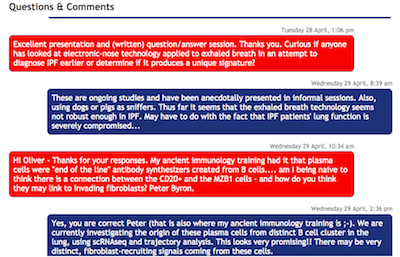Podium presentations
New therapies for pulmonary diseases
On the first full day of the conference, RDD organizers suggested starting with the plenary lecture, presented by Oliver Eickelberg, Head of the Division of Pulmonary and Critical Care Medicine at the University of Colorado and titled, “The Etiology of Fibrotic Interstitial Lung Diseases: Diagnostic Challenges and Treatment Strategies.”
In his lecture, Eickelberg presents an overview of IPF, for which there are currently two approved medications, pirfenidone and nintedanib, and then discusses recent genetic research on risk factors. One breakthrough, he notes, was the 2013 discovery that polymorphism in the MUC5b gene “is not just a risk factor but it also determines survival, apparently,” with TT genotype patients having a better survival rate than the GG genotype. “Does this have ramifications for therapy?” he asks. His response: “There is no definite answer to this at this point but it may very well.”

Another productive research avenue, Eickelberg says, has been proteome profiling, which has identified the MZB1 protein as highly correlated in all forms of fibrosis and led to an understanding that an abundance of MZB1+ cells are consistently found in IPF lungs and are likely a therapeutic target. He also suggests that single cell RNA sequence analysis will lead to additional therapeutic targets for IPF, including both single proteins and cell populations.
In response to a question about administration routes, Eickelberg replied, “I believe the inhalation route will be the best long-term, since doses can be higher and side effects hopefully less. The challenge will be that IPF patients have less lung function, so distribution to fibrotic areas may be limited. While many treatments are still given orally, inhalation will likely become route of choice if it can be delivered at home.”
The RDD meeting was programmed long before the COVID-19 pandemic; and while COVID-19 will undoubtedly be a major topic at future meetings, none of the talks in this year’s first session on “Advances in Difficult-to-Treat Pulmonary Infections” cover the treatment of viral respiratory infections. Instead, the focus is on bacterial and mycobacterial lung infections.


